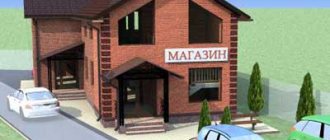How to privatize a plot - procedure
“First, you need to prepare documents that are submitted to the local administration,” says lawyer Yulia Lotova. — To register a plot under a house, title documents for the house are required. In this capacity, there may be a contract of sale or gift, under which the property is received into ownership. You can also attach a certificate of inheritance if the house was received by inheritance or will. An extract from the Unified State Register is attached to these documents - it is necessary to confirm ownership.”
Documents with an application for privatization of a land plot are submitted to the administration in person. You can also use the State Services portal. On the portal you need to select, fill out a special form, attach the specified package of documents and submit for consideration.
Privatization using a garden book
After registering ownership of a dacha plot, citizens automatically become members of the dacha cooperative. Evidence of this is the dacha book, which is issued to the owners by the board of owners. It confirms the fact of membership in the cooperative, characterizes the plot of land, and subsequently records all tax payments.
The “dacha amnesty” gives the owner the right to submit documents for the privatization of a dacha on the basis of a garden book. In addition to this, other available documents for the land and house, a copy of the owner’s passport and a receipt for payment of the state duty are provided. It is believed that the garden book contains enough official information about the land plot and the buildings on it to serve as the basis for making a positive decision on privatization.
In addition, the applicant must provide a certificate that confirms ownership of the land, according to the garden book, and contains a diagram of the land plot. This certificate is issued by the chairman of the board of the dacha cooperative.
Possible difficulties
Difficulties may arise during privatization, despite the fact that the “dacha amnesty” has significantly simplified the process:
- The external boundaries of the land plot have been violated, and information about the area of the plot does not coincide with the cadastre. In this case, you will have to re-register the documents at the cadastral chamber.
- The horticultural partnership, as a legal entity, does not comply with the requirements imposed on it, for example, it violates fire safety and sanitary standards.
- Failure to pay SNT taxes or fines.
- Violations in SNT documentation: about the presence of land users, information about areas, unreasonable registration of excess areas, etc.
If there are violations on the part of the board of the dacha cooperative, privatization may be refused, but the owner can appeal the refusal in court. Refusal due to the fault of the owner may be due to incorrect execution of documents, insufficient number of documents, or non-payment of state duty.
The Department of Land and Property Relations at the municipality of the locality, which is responsible for registering ownership of dacha plots and buildings on it, has the right to refuse privatization to the applicant. The refusal must be made in writing on official letterhead. It must indicate the reasons for the refusal, the document is signed by an official and supported by the department’s seal. With this document, the applicant can apply to the court to appeal the decision that, in his opinion, is unauthorized.
The refusal and its reasons should not be irremovable, therefore, most often, going to court becomes a last resort for the applicant. Typically, citizens eliminate shortcomings on their own and put documents in proper order. To avoid refusal, you should be more careful in preparing documents: pay attention to their relevance and reliability, completeness of information.
Before going to court, the law suggests resolving the controversial issue pre-trial, that is, filing a complaint with a higher authority - the territorial division of the State Property. The complaint is given 15 days to consider. Thus, the pre-trial procedure for resolving the problem is observed, and the case does not come to trial.
Varieties
There are 2 ways to privatize: collectively and individually. Each option has its own advantages, nuances and disadvantages.
Collective
All tenants participate in the event; in most cases, this delays the process indefinitely. The meeting allocates a special person who will handle the design; the work is paid separately.
The authorized person is usually the chairman of the board, who receives a power of attorney signed by each member of the organization.
Procedure:
At the meeting, identify an authorized representative and provide him with the opportunity to resolve legal issues on behalf of the participants.- Conduct preparations: land surveying, issue cadastral passports, collect necessary confirmations.
- Draw up statements about the desire to transfer municipal or state land plots into the ownership of participants free of charge.
- Take permission from the administration.
- Contact Rosreestr and obtain a certificate of ownership for each applicant.
If one of the partnership participants refuses to privatize, this will not affect the others in any way. If desired, he will be able to realize the opportunity on his own, or buy it from the state.
Individual
A personal appeal from a citizen (or an official representative) is provided; the process will go faster.
Algorithm:
- Appeal to the chairman of the partnership for provision of: charter, decision to join SNT, copying of the site, etc.
- Carrying out land surveying in order to clarify the boundaries is carried out at the expense of the future owner.
- Submitting an application to the administrative authority.
- Drawing up an agreement transferring the land into sole ownership.
- Completion of bureaucratic actions, registration with Rosreestr, obtaining a certificate of ownership.
You can receive confirmation in person, at the MFC or through State Services, the process takes 2 weeks.
Which categories are not subject to the procedure?
The current legislation does not allow the privatization of all land plots . What is the exception?
For example, such plots include lands that are part of protected natural sites, forest or water resources, territories that are assigned for federal or municipal needs, lands within the coastal strip, lands in natural parks and reserves, and so on. Find out which categories of land are not subject to privatization in this article.
SNT
SNT lands are often privatized by citizens. Ownership of land in SNT gives participants the right to engage in agricultural activities.
And the presence of legally formalized rights to an allotment gives a citizen the basis to dispose of the plot at his own discretion. However, in some cases privatization may be refused.
This happens if the allotment was excluded from circulation. A ban was imposed on privatization . The state plans to use this plot for other purposes.
The procedure for privatizing a land plot in a gardening partnership is described in detail in another publication.
Agricultural
Agricultural land includes land, areas that are occupied by communications, roads, green spaces, water bodies, buildings, and so on.
Privatization of such a plot is a transfer of the right to ownership into private ownership. It is possible to privatize only those agricultural lands that are currently in state or municipal ownership. Both individuals and legal entities can participate in the privatization procedure .
A refusal to privatize agricultural land can be obtained in a situation where a citizen wants to acquire a plot that is of particular importance. For example, there are buildings on it that supply those around with communications, water, and so on.
Find out more information on how to register ownership of agricultural plots here.
Is it possible to sell land without title?
The lack of land ownership indicates that the privatization procedure was not carried out. This means that a citizen does not have full rights that would allow transactions with real estate, in this case, transactions with land.
Therefore, it will not be possible to sell land without privatization , since a citizen does not have the rights to carry out such a procedure. The land plot is still in state or municipal ownership.
But the state or municipality has the right to sell this land plot to a citizen, thus carrying out a paid privatization procedure, as a result of which the person will become the owner.
Privatization of land plots is a complex procedure that is carried out in several stages. It contains many nuances that you may encounter during implementation. But careful study of the legislation, as well as step-by-step adherence to the plans, will bear fruit; soon you will become the owner of your own land plot.
Legislative regulation
The privatization of a country house on privatized land in Irkutsk is carried out in the same way as the registration of this building in another region of the country. This is due to the fact that the provisions of federal regulations are applied to the procedure. Basic information about the rules for the privatization of buildings is prescribed in the following acts:
- various articles of the Land Code;
- provisions of the Civil Code;
- Federal Law No. 93, containing information about the nuances of using the dacha amnesty;
- Federal Law No. 218 includes data on the rules for registering various real estate properties, which include summer cottages;
- Federal Law No. 191 indicates that the possibility of using a simplified registration method is provided until 2021;
- Federal Law No. 210 contains data on how you can transfer documentation for registration of a building to different authorities.
Local authorities of each region may additionally issue other regulations, on the basis of which adjustments are made to the rules for registering any small object located on a privatized territory. They cannot contradict federal laws. If such contradictions are identified, then privatization is possible through the courts.
Grounds for free-of-charge
In 2021, the legislator has significantly reduced the list of persons who have the right to count on free privatization. Today, citizens who belong to the category of beneficiaries have this opportunity.
Another group of people with privileges are participants in the “dacha amnesty” program.
The category of beneficiaries includes the following citizens:
- Military personnel.
- Heroes of the Russian Federation.
- Heroes of the USSR.
- Veterans.
- Orphans.
- Families with three or more minor children.
- And other categories of persons established by municipal authorities.
Forms and types
Like any other procedure, land privatization can occur on a paid or free basis. Let's find out when we have to pay?
Free
Initially, regulations and legal acts allowed privatization on a free basis only until the end of December 2013. However, after a lot of criticism, the State Duma reconsidered this issue and state free privatization was extended until March 1, 2015.
Then a decision was made to extend it until 2021, but today this process is indefinite.
When can a citizen count on free privatization? This question is answered by Article 39.5 of the Land Code. This norm lists the grounds that give a citizen the right to use the free procedure.
A citizen can get rid of the need to pay money if:
- he has three or more minor children;
- received a plot of land for free personal use from a subsidiary plot.
However, the laws of the constituent entities may provide for other additional grounds that give the right to free privatization.
Important! If a citizen received a plot of land for the construction of a summer house, garage, house, etc. before 2001, then he can count on a free procedure.
More information about what free privatization of a land plot is, who is entitled to it, and how it is formalized is described in a separate publication.
Paid
Paid privatization of a land plot is carried out in accordance with Federal Law 178-FZ . A citizen has the right to receive ownership of any part of the land or the entire plot if there are any buildings and real estate objects located on it, for example, dachas, houses, outbuildings, and so on. The main thing is that these objects are registered with government agencies.
The land received after 2001 is privatized on a paid basis. The amount is small, but should be transferred as a purchase of the site from the state.
The amount is not set in a single equivalent, but is calculated . Municipal or federal authorities calculate the total by comparing land prices in the area, as well as based on the amount of land tax. Also, when assigning a value, they rely on the established cadastral value.
Is it necessary to purchase municipal land?
Each citizen decides for himself whether he needs to acquire ownership of a plot of land or not. In many ways, this question is individual, as it depends directly on the characteristics of the site itself, the citizen’s plans, as well as some legal and legal aspects.
Until what year is it extended?
And yet, if a citizen’s plans include privatization of a land plot, this procedure should not be postponed “for later.” In accordance with the law, the so-called “dacha amnesty” has been extended until March 1, 2021. This means that certain categories of citizens can resort to the privatization procedure before the specified moment .
The categories of persons who can take advantage of such an extension include owners of non-residential and residential buildings that are located on SNT, as well as owners of objects that are located on a site intended for dacha farming and gardening.
These changes were introduced by Federal Law No. 20 of February 28, 2015.
Special attention should be paid to the timing of the privatization procedure . If previously the process lasted for several calendar months, now it can be completed in just two or three weeks. However, if cadastral work is required on the site, the deadlines will be increased.
Why do this?
A country house, unlike a private house, is not a place of permanent registration. According to the law, dachas are intended only for temporary residence - for example, in the summer during sowing and harvesting. In winter, the buildings are not heated, therefore, they are unsuitable for year-round living. But nevertheless, privatization of a dacha is very beneficial from a legal point of view.
Advantages of privatization of a dacha (garden) building:
- Obtaining the right to dispose of real estate: sell, rent, exchange, include in inheritance or pledge, give as a gift;
- Joining a garden or vegetable cooperative.
- Receiving state compensation for seizure.
Based on this, the citizen becomes the full owner of the country house. At the same time, it is possible to privatize the land plot.
✅ Cost, expenses
The main costs of privatization are related to payment for geodetic services. However, Federal Law No. 93 on the dacha amnesty states that land surveying may not be required.
Let's consider several conditions for such an exception:
- no need to clarify boundaries with neighboring areas;
- the issue of borders was resolved with the neighbors by agreement.
As for other cases, the price of cadastral work will cost from 8,000 rubles and more , depending on the region.
The costs will also affect state fees for registering a transaction. If a garden plot is registered - 350 rubles , if other land - 2,000 rubles .
In total, privatization of a dacha and land plot will cost from 12,000 rubles. All calculations are individual, so the price may vary.
Where to start privatizing a dacha: order and procedure
First of all, you should find out whether you have the right to privatize your dacha in a gardening partnership. Free transfer of municipal or state property into private ownership is available to a person only once in his life.
The privatized garden plot should not be withdrawn from circulation, there should be no arrest or other encumbrances on it. Once you are sure that everything is in order, you can begin to design your dacha farm.
Order and procedure
To successfully implement your plan, you will have to visit only three authorities:
- horticulture;
- city hall;
- Rosreestr.
Step-by-step instructions for independent privatization of a summer cottage.
| No. | Step-by-step instruction |
| Stage 1 | You apply to the local administration for a certificate stating that this land can be provided to you as private property. After receiving a positive decision, you enter into an agreement for land surveying with a licensed geodetic company (paid service). |
| Stage 2 | Contact the mayor's office and provide all the necessary documents to the land relations department. After 14 calendar days (no later), either consent to privatization or a reasoned refusal will be given. |
| Stage 3 | After a positive decision by the local government, a privatization agreement is drawn up, on the basis of which the land plot is registered in the cadastral register at the territorial office of Rosreestr. |
| Stage 4 | To enter data into Rosreestr, a corresponding application is written, to which are attached: the decision of the mayor's office on the provision of an allotment, a privatization agreement, a receipt for payment of state duty. Within 10 days you will receive an extract from the Unified State Register of Real Estate. |
Statement
The application for privatization (for the mayor's office) must indicate:
- name of the registration authority;
- Full name, TIN, passport and contact details of the applicant;
- exact area and address of the site;
- information about existing encumbrances or their absence;
- information about buildings located on the site;
- purpose of using the site.
Expenses
Many people are interested in the question: how much does it cost to re-register property from state to private?
You won’t have to pay anything for the privatization itself, but other services, without which completion of the re-registration is impossible, are provided on a paid basis:
- issuing a cadastral passport will cost you 1,500 rubles if issued in paper form and 300 rubles if issued in electronic form;
- price for cadastral work from 10 thousand rubles;
- for registration of property rights you will have to pay another 350 rubles (Article 333.33 of the Tax Code of the Russian Federation).
Deadlines
- It will take you 10 days to prepare the documents;
- cadastral work will last at least 2 months;
- the cadastral passport will be produced in 30 days or a little more;
- the local administration considers the application within 14 days;
- Rosreestr processes the application within 5 days;
- The registration certificate is issued – 14 days.
Peculiarities
In the issue of land privatization, one cannot avoid any nuances and subtleties.
Is it possible to privatize a share of a land plot?
It is allowed to privatize a share in a land plot , however, this procedure is accompanied by some nuances:
- To do this, you need to allocate a share in kind in the home ownership. That is, thus ending shared ownership. A division agreement is concluded between all owners of the plot. The share registers the ownership of part of the building.
- Next you need to resort to the land surveying procedure. The changes made should be reflected on the cadastral map.
- Then the citizen must draw up an application for the provision of plots of property. After this, a decree is issued in his name, according to which the allocated share becomes his property.
- The following is the general procedure for registering rights.
We have described in detail about the privatization of a land plot into joint ownership, for example, by residents under an apartment building, here.
No buildings
In accordance with the law, only that land plot without buildings that previously belonged to a citizen of the Russian Federation under a lease or perpetual use agreement can be privatized.
In essence, what will happen is not privatization, but re-registration. Only those land plots that were provided for the purpose of gardening, individual housing construction, subsidiary farming and gardening can participate in such a procedure.
Under the garage
The owner of the garage can also become the full owner of not only the building, but also the land underneath it . The privatization procedure will require going through three stages:
- You need to get a certificate from the chairman of the garage cooperative, which indicates that the cooperative was registered with the local administration.
- Then you need to go to the BTI along with a certificate in order to obtain a technical description of the land plot under the garage.
- At the registration chamber you need to find out the necessary list of documents, create a package and again appear at the registration chamber to issue a certificate that will secure you as the owner of the land under the garage.
We wrote about the nuances of privatizing land under a garage in another article.
For rent
Legislation allows the privatization of plots that are leased . However, in this matter you need to rely on the date when the contract was concluded. If the land plot was leased before January 1, 2001, then privatization is possible. However, if the contract was executed after this date, then in this case registration of ownership rights can only be carried out for a fee.
Everything is explained by the adoption of the Land Code of the Russian Federation in 2001.
The procedure is divided into several stages:
- A package of documents is being prepared.
- Cadastral registration of the territory.
- Applying to the administration or the Federal Property Management Agency.
- Issuance of a permitting act for privatization.
- Registration of the site in Rosreestr.
Read more about how to privatize leased land here.
Country house on its own
The legislation of the Russian Federation states that it is not necessary to privatize a dacha building, since it is located on a plot of land that is owned by a citizen.
Therefore, if you have already carried out procedures for privatizing land, then this is quite enough. However, if in the future it is planned to transfer the country house by inheritance, sell it, and carry out other transactions, then the privatization procedure must be carried out.
This process is quite simple and is carried out on a general basis. Read more about the privatization of a country house on your own land here.
What does it give
The procedure allows a person to become the full owner of a country house, country house or other building and dispose of it at his own request:
- rent out;
- construct an industrial building on its territory;
- used for growing crops, etc.;
- carry out purchase and sale or exchange transactions, draw up deeds of gift for property.
There are also certain obligations: you need to pay taxes on income, adhere to the intended purpose of using the site, and respect the rights of neighbors.
To avoid situations where municipal or state authorities can take away property by offering minor compensation, it is important to register its ownership. And thus provide yourself with the opportunity to own and freely dispose of expensive property. Alienation of personal property is the first thing to be done with real estate.
What does the law say?
A simplified procedure for the privatization of country houses and garden houses is prescribed in Federal Law No. 93, here are the most important provisions:
- according to a simplified scheme, only houses on plots provided for use before 2001 are privatized;
- type of land right: lifelong inheritable ownership or perpetual use;
- the number of procedures in a simplified procedure is no more than one. For persons under 18 years of age, this option is not limited;
- Russian citizenship is mandatory;
- Service houses and those in disrepair are not subject to privatization. The list may be supplemented by the decision of local authorities;
- permits for construction and commissioning are not required;
- transfer of ownership of the house is free of charge. You will only need to pay a small state fee and pay for cadastral work.
A simplified procedure for the privatization of a garden plot is prescribed in Federal Law No. 137. According to it, in the absence of at least some documents for the land, that is, even in the absence of a book of a member of the SNT, it is enough to present a decision of the meeting of the partnership that this person is a member of it and has rights to the plot.
✅ Legal assistance
A huge number of legislative acts and regulations cause difficulties with the privatization of dacha buildings. The situation may be aggravated by the lack of documents. Then there will be litigation. All this is quite a responsible and complex process. An incorrectly drawn up application or lack of certificates is a clear reason to be refused privatization.
We suggest contacting a lawyer for a free consultation.
Experts in the field of housing and land law work with us. The lawyer will draw up a step-by-step algorithm of actions, help determine the list of documents and advise on how to privatize a country house according to a simplified procedure. Use the help of a lawyer and you can complete the procedure correctly! Attention!
- Due to frequent changes in legislation, information sometimes becomes outdated faster than we can update it on the website.
- All cases are very individual and depend on many factors. Basic information does not guarantee a solution to your specific problems.
That's why FREE expert consultants work for you around the clock!
- via the form (below), or via online chat
- Call the hotline:
- 8(800)302-39-65
— All residents of the Russian Federation - +7(495)128-69-80
— Moscow and the Region - +7(812)509-13-65
— St. Petersburg and region
- FREE for a lawyer!
By submitting data you agree to the Consent to PD Processing, PD Processing Policy and User Agreement.
Anonymously
Information about you will not be disclosed
Fast
Fill out the form and a lawyer will contact you within 5 minutes
Tell your friends
Rate ( 2 ratings, average: 5.00 out of 5)
Author of the article
Maxim Privalov
Lawyer. 2 years of experience. I specialize in civil disputes in the field of housing and family law.
Author's rating
Articles written
614










